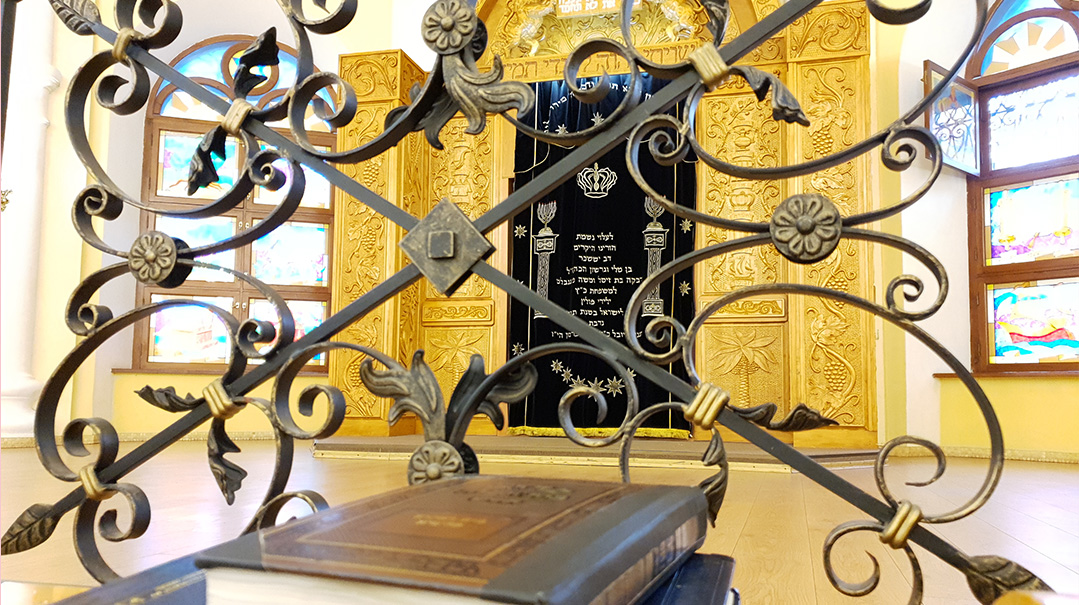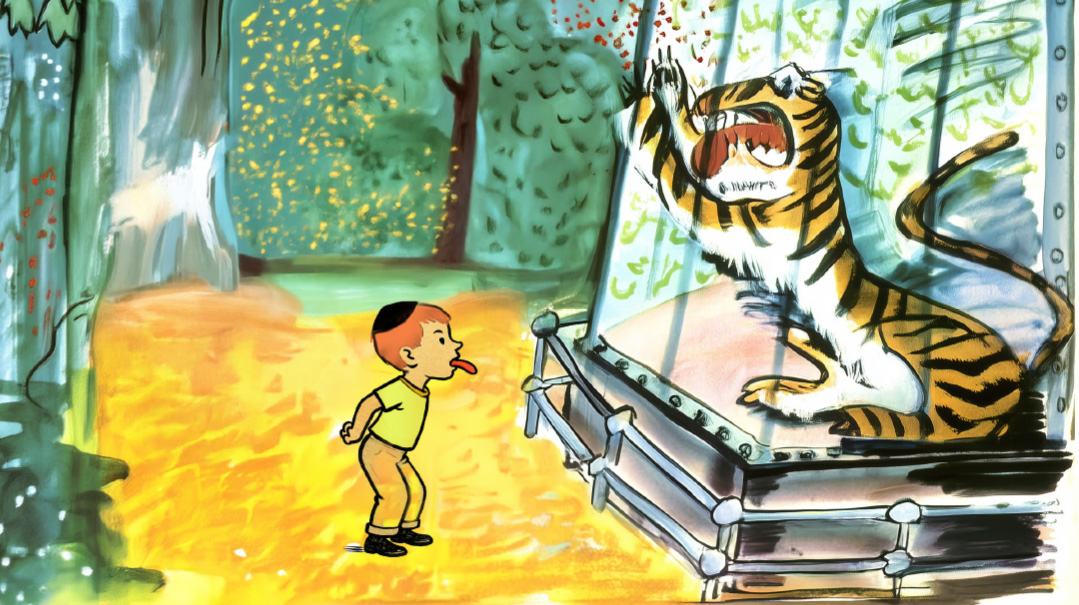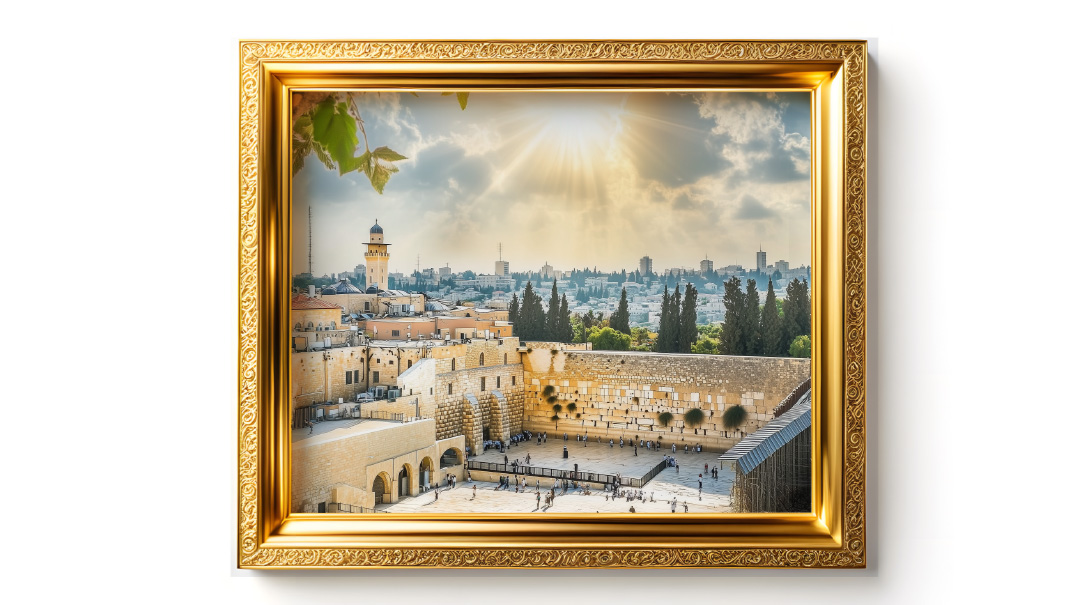He Loves Me
| September 28, 2022“You did a really big aveirah. You must do teshuvah to the Eibishter.” She doesn’t know how. She feels scared and small

Six
She runs behind the shul, peeks into windows. First the men, loud and heartfelt. Skip along the path to the women, hushed, respectful. She examines the nosh in her pekeleh. Holds the bag over the noisy central air condenser and it dances. Rattles. Her friends laugh. Then they leave.
She enters the women’s section. From the men’s side, her father’s voice. She is proud. But no one is looking at the mechitzah; they look down. No smiles.
Next to her, the girl who is forever scolding the younger girls stands. Lifts a hand and knocks her chest. Again. Again. Again. She peers up at the girl’s face. So still, severe. She runs out of shul.
“You lied.”
She twists her sticky fingers together. He’d told her, “Don’t eat at the neighbors, they use different hechsherim.” But it was ices that looked like those in their own freezer.
She denies her misdeed. How does he even know?
“You did a really big aveirah. You must do teshuvah to the Eibishter.”
She doesn’t know how. She feels scared and small.
Eight
The sun outside is gorgeous, but the house is moody with Mommy in shul. She bangs the storm door open again. She is restless, and it’s still only morning. She checks the kitchen, hungry. An apple, ohhhh, Ostreicher cookies. She reaches for the bag.
Her sister is fasting, and she snaps, a reflex: “Yom Kippur!”
She snatches cookies and shame. Eats outside.
Ten
So many parables. A king. A son. A princess. Dirty and lost. Kidnapped. But our Father hears our voice, and so we must cry. It is said that a person who doesn’t cry during the Aseres Yemei Teshuvah must examine his deeds.
Eleven
She takes her place in shul. “I will stay at least two hours,” she pledges. She finds her place. Loses it. Finds it and loses it intermittently. She likes the way the men accompany her father, sudden waves of sound, of majesty, in the stillness.
She counts the pages. Searches for the place. Mumbles along quickly, quickly, they are going fast now. Now they are going so slowly she can enunciate a paragraph per word.
She rises. In her mother’s eyes: disappointment. You said two hours. In her heart: guilt.
She slips out. At home she reads and eats grapes and chocolate cake. Waits for the endless day to end.
Twelve
Why was it so easy to fast on Asarah B’Teves when she was 11?
Unesaneh Tokef. Her sister sways tightly, red-eyed.
Hinei Yom Hadin!
Day of Judgment. Just get through it, promise to do good, be good. Even while her sinking gut knows her promises are transient, for who can pledge perfection for a year?
She watches her friend’s mother. High, white turban. Gentle face, furrowed brow. Mi yichyeh umi yamus. The mother cries and cries. She is so holy.
Thirteen
Her sister, married now, davens next to her again. Everything her sister wears is new; the tichel is white and pure. Like her face. Like her soul.
Her own diary reads:
… a year henceforth
We stand side by side
Her soul shining
In contrast to my own
Promises not kept
Things I did not try
Overcome with remorse
I hang my head and cry.
Fourteen
Her hair is awful. Straightened just yesterday, and now the ends are flipped and wrong. At least her sweater is nice, a smart, wrap-around knit. Cringe-free couture.
She reaches a finger to pick at her face, hears her mother in her head, Never touch your face. She flips pages and checks out hairdos and shoes until her sister comes, and she is sent to watch the kids at home.
Fifteen
Who is Hashem?
Her mind: Merciful and good. Hashem, Hashem, Kel rachum v’chanun erech apayim v’rav chesed…
Her heart: High and far. Ambiguous. With her father. Her principal. Her perfect sister. A tight circle of holiness.
And she, below. Flawed.
Sixteen
She sits and counts minutes and pages and tears that others shed. Nearby, her sister shifts and stands. Wobbles. Early pregnancy is brutal to her; she staggers home.
She waits the hours out. Eons later, the shofar.
She finds her sister in bed, basin full of misery on the floor. Hacking sobs. “I didn’t even manage Ne’ilah.”
The anguish she sees twists her heart.
Seventeen
She sits. Before her, a neighbor. Freckled, vivacious. Her gaiety is now in her swaying. Effervescent. Her two children cling to her, she nods and smiles and points. They slip away. Now her face is awash with tears. She is perfection.
Unesaneh Tokef. This year, too, her own face is dry.
Yisgadeil v’yiskadeish, ay yay yay yay yay. A feisty young grandmother sways and claps and taps the mechitzah with maroon nails.
Gentle elation. Seeing this, her throat is tight. Her eyes fill.
Eighteen
She stands. Sways gently. On her finger, a diamond. On her neck, pearls. In her hands, soft leather. A new name engraved. Her heart aches with thanks and prayer as she anticipates, asks for joy.
Nineteen
A sea of new faces. Her mother-in-law nearby, an anchor.
She stands, cries into her machzor. Let me be a mother this year.
Twenty
Her head swims. Chairs shuffle, and she sits heavily, supports her head. Mouths the words amid thoughts of new life and water. Glorious water! And food. Juicy, refreshing. Apples. Grapefruits.
The shofar.
She waddles home with relief and regret. Hears Havdalah. They go out to buy ten grapefruits.
Twenty-one
K’rachem av al banim, kein terachem Hashem aleinu.
Why k’rachem av? Like a father? Why not simply a father? What then, k’avadim? Why not a father, Basheffer?
Why, why, why?
Did someone point this out to her, or was it an email printout fluttering around? She forgets. But the words tingle and live and breathe and touch her where it hurts and fill up cracks, and suddenly she is ravenous.
She perseveres. The words: some make her want to run in a sunny field. Sing on a mountaintop. Other tell her to curl up like a fetus and cry.
VeHu Keili. He is my G-d.
Twenty-three
Kol Nidrei and Maariv in her small apartment. Her two sons slumber. Her husband, in shul. She is alone and unheard. She should talk from her heart.
She puts her machzor away. Sits on her little couch, feet prim on the floor. She feels His presence. Looks down.
“You.” Halting speech.
“You’re here. I know You are.”
Something is knocking furiously against her core, straining to get out.
“I want to know You better.”
Do I?
Her heart hitches. Truths so deep she doesn’t know them, and already they are pushed into thoughts, then words, tumbling out.
“You’re not a frightening, vengeful G-d Bashefer! You’re not! You’re here right now, and You’re listening to what I’m saying, I know! And You love me. You do!”
Darkness. Whispers of broken promises, the scratch of flaws and sin, the vise of guilt. But soft light, hope. Her soul has wings tonight, it is fire, and her heart shatters and becomes whole.
“You love me — even!”
A shout. A primal cry.
Why k’rachem av? Because fathers are the parable. A comparison incomplete, for how can an earthly being love like Him?
“You love me. You do! You love me.”
Her head falls against the cushions. Tears of healing seep into the little couch.
Sobs. She grasps her elbows and rocks, pounds her fist on the armrest.
“You love me!”
(Originally featured in Mishpacha, Issue 812)
Oops! We could not locate your form.







